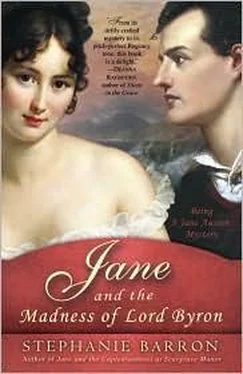“The paper is merely by-the-way,” Mona said indifferently. “If his lordship does not require it, of course I shall take it back again. But the provisions must be useful, I am sure. May we present them to his lordship?”
“Present them?” The sentry on the left turned his head indignantly and glared at Mona. “The gentleman is wanted on a charge of murder, your la’ship! He is not a lion-tamer out of Astley’s Amphitheatre, nor yet the darling of the London stage! If you wish to see ’im, you cannot buy tickets—but by all means do attend ’is ’anging!”
At those words, to my astonishment, Desdemona abruptly began to sob. So overcome was she, that the hamper was nearly dropped from her nerveless hands; she swiftly covered her face and cried her heart out. I moved to comfort her, my arm about her shoulders, and looked to the sentries in reproach. “Heartless! How can you speak so, to a lady that has known his lordship from the cradle!”
The two men looked uncomfortable enough at the sight of Mona’s weeping; my words only increased their chagrin. “Beggin’ yer pardon, ma’am, but you’ve no notion how many young ladies—shameless camp followers, most of ’em—’ave dallied by this sentry post and offered any amount of money or favours to be admitted to his lordship, private-like,” one said.
“Some o’ the things they’re promising would tempt St. Peter, they would,” the other echoed.
“That is not our object,” I said sternly—there is some benefit to being an aging spinster dressed in black; the sentries quailed as tho’ I had been their mamma—“our sole concern is Lord Byron’s health. He possesses a most delicate constitution. If you intend to hang him, you had better ensure that he lives long enough to stand his trial. Now, be sensible—and convey that hamper into his lordship with the compliments of the Earl and Countess of Swithin.”
The sentry on the right—who could be no more, I guessed, than eighteen—saluted me as tho’ I had been an officer, and scurried to retrieve the basket from the ground where it lay. Carrying it gingerly, he first unlatched the wicket, and peered within Lord Byron’s cell; then said, in an aside to his fellow, “Writin’ again. ’E’s all over ink. And ’e’ll be askin’ to ’ave ’is pen mended again, just you wait an’ see. No pen-knives allowed the prisoners,” he added, for my benefit.
“Naturally not,” I agreed with quelling coldness.
The sentry unbarred the door, and carried the hamper within. After an interval of several moments, he reemerged with a packet of paper in his hands.
“The prisoner thanks ye kindly fer yer consideration,” he said, as tho’ having got the words by rote, “and asks that you convey these pages to Lady Oxford. If he is to hang, Lord Byron says, it would be something to know as his verses is published.”
I held out my hand for the pages; they had been enclosed in a cover, and sealed clumsily with the wax from Byron’s tallow candle. A letter? Or more lines from The Giaour ?
Mona subdued her sobbing to a few dying sniffles.
“You have my gratitude, dear sirs, for your exceptional kindness,” she breathed with trembling sincerity. “You will be blessed, I am sure, in Heaven!”
Such a picture as she made, with her tear-stained cheeks delicately overlaid with rose, that she might almost have been another Sarah Siddons—and I recollected, for the first time, that her grandmother had tread the boards of the Comédie-Française.
“Lord, Jane,” she said as we walked with dignity back towards the barracks, “I was all of a quake lest they look inside the hamper. For beneath the roast chicken, the Gloucester cheese, and the lemon tart, is of course a pen-knife—for how could I neglect to send Byron one?”
Chapter 29 The Viscount’s Tale
FRIDAY, 14 MAY 1813
BRIGHTON, CONT.
WE HAD NOT ACHIEVED OUR OBJECT—TO CORROBORATE Caro Lamb’s tale, and enquire of Lord Byron why he had failed to follow Catherine Twining from the Pavilion on that fatal night—but we had in our possession a packet that might prove a love letter for Lady Oxford; and this was no end cheering to Desdemona, whose heart was softer than mine. Lady Oxford, she informed me, had taken to her bed on the strength of Byron’s imprisonment—and must be cheered by some word from him.
“Tho’, do you know, Jane, that he had the presumption to charge her with unfaithfulness at the Assembly last evening! Was there ever anything more unjust?—When she has sacrificed so much for Byron’s sake—and even now remains in Brighton solely out of consideration for him!”
“Lady Oxford had better consider of her children,” I retorted, “for I assume her husband has long since been forgot.”
“The Earl is not very memorable, that is true,” Mona said doubtfully, “but whatever Jane Harley’s sins may be, neglect is not one of them. I am sure that has all been on the other side, for Oxford is very well cared for, and never troubles himself about Jane’s affaires —as he has had countless High Flyers in keeping!”
On such a point of mutual disagreement, as to the nature of marital happiness, it was as well to keep silent. I could only be thankful that Mona’s domestic arrangements were not patterned along Harleian lines.
We emerged into the main thoroughfare of the Camp, and espied the Countess’s groom walking her team and phaeton to an admiring audience of common foot soldiers. Among them, however, I noticed a glossy charger commanded by a captain with a familiar face—Captain Viscount Morley. The blond god who had danced his last with Catherine Twining at her fatal Assembly looked haggard this afternoon; a riband of black crape was tied about his right arm. Had he attended Catherine’s obsequies that morning?
“Thank you, Hinch,” Mona said as she approached her groom. “Pray go to their heads.”
“Allow me to assist you, Countess.” Morley had dismounted, and tossed his reins to a brother officer; now he stood by the phaeton, offering his hand, and Mona, accepting it, sprang lightly into the carriage. Immediately, he turned to me with a smile, and offered to spring me into the other side. As Mona fingered the reins and the team tossed its heads, the Captain observed, “A lovely pair! I envy you up behind them.”
“You should not, if you saw how the Countess drives,” I murmured.
Morley smiled. “I have often observed her, in Hyde Park of a spring morning; and tho’ I admit her to be a very dashing whip, I cannot think you in any danger, Miss—Forgive me, I have forgot your name.”
“Austen,” I said. “And you are Captain Viscount Morley, I believe?”
“Got it in one.” He glanced at me ruefully as I ascended into the equipage. “I must do better, next time we meet, Miss Austen. That was unconscionably rude.”
“Not at all,” I assured him. What boy of four-and-twenty, as I judged him at most to be, should concern himself with the name of a spinster seen once in a crowded room, whose dress proclaimed the dowd, and grieving mourner? “But if I may presume upon our chance acquaintance—I observed your armband—may I ask whether you attended Miss Twining’s funeral this morning?”
His gaze dropped. “I did, so help me. To think that such a perfect being is laid into the earth—but forgive me. I should ask rather whether you knew her.”
“Pray, do not hide your sensibility on my account. I was a little acquainted with Miss Twining.”
“Ah! I had thought you a stranger to Brighton—a guest of the Countess’s.”
“A visitor to Brighton only, to be sure—my home is in Hampshire—but I first met Miss Twining on the road from London, at Cuckfield.”
Читать дальше












